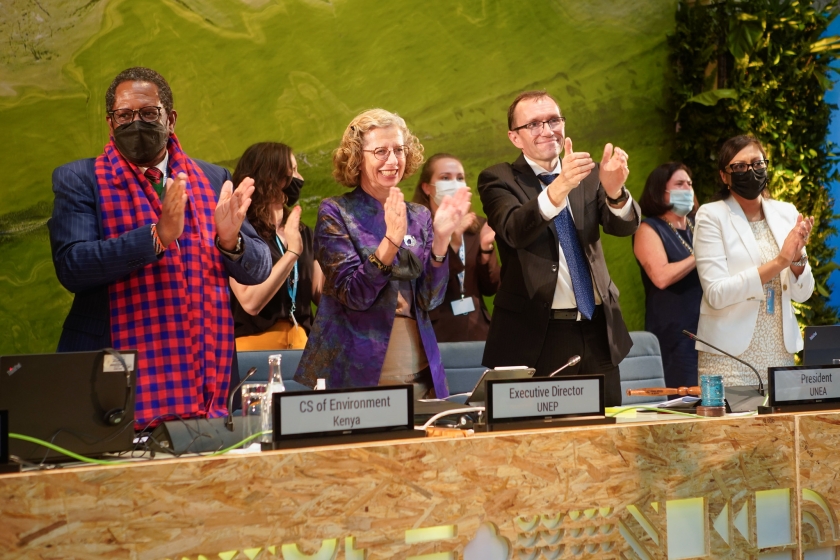UNEA5.2_Adaptation of a Legally Binding Global Plastic Treaty

UNEA5.2 Adopted Historical Resolution to End Plastic Pollutions!
Nearly 175 nations including Bangladesh unanimously agreed to form an intergovernmental committee to discuss and finalize a legally binding plastic convention by 2024 at the UNEA5.2 in Nairobi
Dhaka 3rd March 2022: At UNEA5.2, The UN Member states just adopted a landmark mandate calling for the development of a legally binding of the world’s first Global Plastic Pollution Treaty with a full life cycle approach. It is being described as the most significant green deal since the 2015 Paris climate agreement.
Nearly 175 nations including Bangladesh agreed to form an international committee to discuss and finalize a legally binding plastics convention by 2024 at the UN Environment Assembly in Nairobi, Kenya on 2nd March, 2022. The mandate, titled “End plastic pollution: Towards an International Legally Binding Instrument” invites governments to negotiate a legally binding treaty that addresses the entire life cycle of plastic. Member states have been meeting in Nairobi for more than a week to finalize the outline of a pact to combat rising plastic pollution, an environmental crisis that reaches from ocean trenches to mountain tops. Plastic waste in all its forms has been given a broad mandate by negotiators, including not just bottles and straws in the ocean, but also invisible microplastics damaging the air, soil, and food chain.
Chairperson of ESDO and Former Secretary of Bangladesh, Syed Marghub Murshed welcomed the agreement and said, “Clearly, this is a moment for all of us to be proud of. This agreement will assist us in putting an end to plastic pollution, which will prevent extensive environmental damage in the future decades”. This is also a proud moment for Bangladesh as because we are the first country of the world to ban Plastic bags in 2002, he added.
This is one of the significant milestones for ESDO as they have been working for the last 32 years to combat plastic pollution. ESDO have been continuously advocating for a proper plastic legislation in Bangladesh as well as for a global plastic treaty because a global problem needs a global solution. ESDO recognized all the plastic Warriors throughout the world for their tremendous contribution, in particular, Global Alliance for Incinerator Alternatives – GAIA, Break Free from Plastic – BFFP, Environmental Investigation Agency – EIA, Center for International Environmental Law – CIEL, International Pollutants Elimination Network – IPEN. ESDO also recognized the contribution of Ministry of Environment, Forest and Climate Change and Department of Environment of Bangladesh for their outstanding support.
The scope of this agreement encompasses the whole life cycle of plastic and might result in new manufacturing standards, product redesign for better recycling, long-term usage, and improved waste disposal. Any agreement that restricts the manufacturing, usage, or design of plastic will affect oil and chemical companies that manufacture raw plastic, as well as consumer goods corporations that sell thousands of products in single-use packaging. Resistant from relevant industries may come but everyone needs to work even harder to process this agreement.
The future agreement will seek to fill gaps that existing initiatives and agreements do not address, particularly in the design and production phases of the plastics life cycle. It will bring all stakeholders together to achieve the overall goal of eliminating plastic leakage into the environment. The first round of negotiations is expected to begin in the second half of the year.
According to Dr. Shahriar Hossain, Secretary General of ESDO, “It is important to remember that the agreement will only be considered valid if it contains specific, legally obligatory clauses. We still have a long way to go, but we believe this is the beginning of the end of the world’s plastic waste crisis, he added.
Executive Director of ESDO, Siddika Sultana stated “Over the years, ESDO has made tremendous efforts in outreach, collaboration, and establishing support to combat plastic pollution. ESDO believes that this is a significant achievement for us all and will help the world to fight the plastic pollution crisis.”
ESDO is working relentlessly to ensure biological diversity since its formation in 1990. It is the pioneer organization that initiated the anti-polythene campaign in 1990 which later resulted in a complete ban of polythene shopping bags throughout Bangladesh in 2002. Since then, ESDO has been advocating continuously for the complete ban of Single-use Plastic. As a result, the High Court of Bangladesh based on a writ petition filed by BELA on behalf of ESDO has ordered the authorities concerned to prepare the ground for banning single-use plastics in coastal areas, hotels, motels, and restaurants across the country in the 2021 year. Later in a hearing on 10th February 2021, the High Court of Bangladesh has ordered the concerned authorities to phase out Single-use plastic products within 31 December 2022 from the coastal area. Following the High Court’s order, the Ministry of Environment, Forests and Climate Change has issued a gadget instructing all concerned to completely stop the use of single-use plastic from 12 coastal districts of Bangladesh by 2023
For more information please contact:
Email: info@esdo.org,
Mobile: +8801726053420


